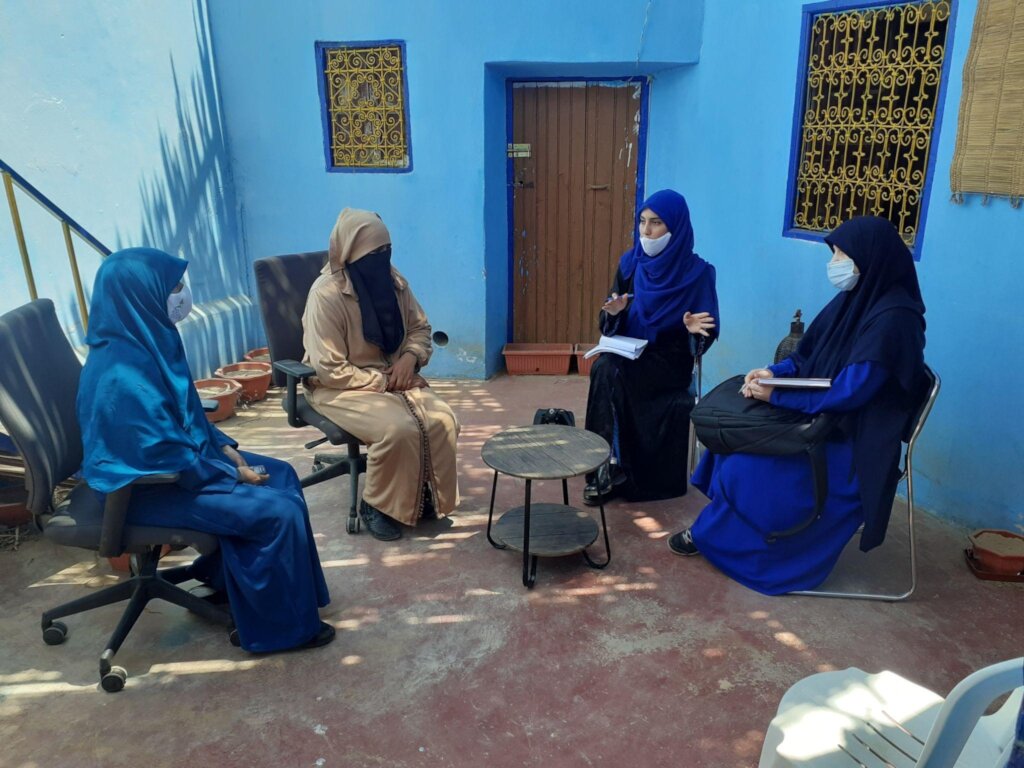By Zineb Laadam | HAF Field Officer
Over 12 percent of humanity contributes to one of the 3 million cooperatives on the planet. Cooperatives not only stimulate local economies, but also act as a vehicle for bringing opportunity and profit to people worldwide who otherwise would not be actors in the formal sector of the economy. This tangible empowerment is perhaps best embodied by the female cooperatives in Al Haouz province, Morocco.
This progress, though commendable and remarkable, is just the first step. The path to sustainable development is not easily achieved. Through their partnership and work with the High Atlas Foundation and Farmer to Farmer (F2F) program, the cooperatives of Al Haouz province were given the skills training necessary to grow tremendously. They embody what is possible with this support and facilitation of development.
Most women in these cooperatives could not read or write, but now they are taking literacy classes at the co-op and are able to maintain their revenues, expenses, or costs through the F2F record-keeping assignments.
However, the COVID-19 crisis disrupted the value chains for these women’s cooperatives in Morocco. The ensuing government-mandated national quarantine has disrupted them as well, leaving women and their families without reliable sources of income. Moreover, due to restricted physical mobility, the local markets have been closed, making access to commercial platforms impossible. “We thought about using E-marketing, but it was difficult for us, we had to be supported so we could directly sell our products through online platforms to minimize financial losses,” explains Malika from Aljamaane cooperative, located in the Setti Fadma rural municipality in the Al Haouz province.It is a cooperative with low potential and therefore easily suffered significant losses. However, the women did not stop producing Moroccan couscous and herbs.
"At the beginning of the pandemic, with the weekly local markets closed, it was very difficult for us to find a solution to sell our products,” adds a member of Aljamaane cooperative. "When a young man from our village agreed and volunteered to sell our products outside of the rural area. We were able to sell and to negotiate product prices with clients through him, allowing us to take advantage of this unique opportunity under difficult circumstances” she concludes.
Despite the pandemic, members of the women-led cooperative Aboughlou continue working on preparing Moroccan cookies, baked foods, and dried plants, with the approval of local authorities, while respecting physical distancing and other prevention measures to stop the spread of the virus.
The cooperative started in 2016 with 10 women from one village. Now, there are 30 women from five different villages actively participating.
The women that comprise this cooperative grow Calendula, Saffron, Rose geranium, Verbena…, among other herbs that are well known for their health benefits. These herbs are then bought by health food, grocery and cosmetic stores as well as herbalists, delicatessens, and others. However, preventive lockdown measures led to the closure of the cooperative's nursery, and its drying and packaging units, thus interrupting the value chain and, with it, the sustainability of the cooperative's income-generating activities. If these women stopped working in their cooperative and nursery, an entire season’s worth of labour and yield would go to waste.
The Amzarou cooperative in Tidili Messfioua, a municipality in the Al Haouz Province, faces similar challenges as Aljamaan. “Climate constraints and the COVID-19 crisis taught women in Tidili Messfioua to not depend solely on a single agricultural activity,” explains Sanae, secretary of the Amzarou Cooperative, where women are particularly concerned about their barley and olive harvest. “To be able to meet their financial needs, women must diversify their agricultural activities to include livestock, mixed farming, plant production and even ecological tourism.”
In response to this situation, the Amzarou cooperative, recently established in 2020 by local women, took a bold chance after an Imagine workshop organized by HAF to create the cooperative and produce pastries. Currently, they have started working on multi-production by adding new activities like verbena production and preparing for poultry farming to obtain a good collection of eggs intended for marketing. The Amzarou cooperative have become able to work along the entire agro-ecological chain, from cultivation and production to transformation, packaging and commercialization thanks to the F2F volunteers who worked with them. These women truly set an example of what is possible when given support and opportunity.
While the pandemic exposes and exacerbates different forms of inequalities and vulnerabilities, it also makes clear that women are actors of change and are capable of responding to a crisis of such magnitude.
When considering all these astonishing circumstances, it is obvious these women, who are successfully managing their own well-established cooperatives, are extraordinary exceptions. But that should not be the case. It is just and right to commend the women of these cooperatives, but the ladies of the cooperatives Aljamaane, Aboughlou and Amzarou are a much-needed reminder not only of what is possible but of what should be.
Project reports on GlobalGiving are posted directly to globalgiving.org by Project Leaders as they are completed, generally every 3-4 months. To protect the integrity of these documents, GlobalGiving does not alter them; therefore you may find some language or formatting issues.
If you donate to this project or have donated to this project, you can receive an email when this project posts a report. You can also subscribe for reports without donating.
Support this important cause by creating a personalized fundraising page.
Start a Fundraiser